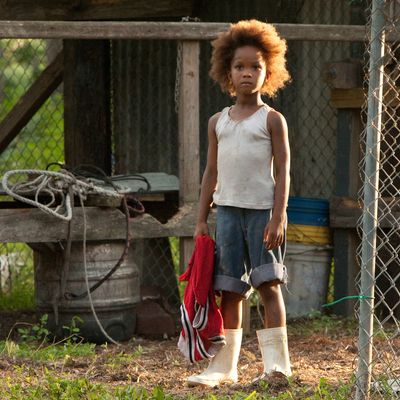
The motherless six-year-old called Hushpuppy (Quvenzhane Wallis) who narrates Benh Zeitlin’s Beasts of the Southern Wild spends a lot of time thinking about how future civilizations will look back on her and the hardscrabble underclass denizens of the marshy Louisiana lowland called the Bathtub. She says, “In a million years, when kids go to school, they’re gonna know: Once there was a Hushpuppy, and she lived with her daddy in the Bathtub.” That’s a lot of confidence for one so young, but she is, after all, the alter-ego of her 29-year-old director, the son of two folklorists who moved (with friends from Wesleyan College) to New Orleans to take his family business to the next level. Zeitlin swings at the moon in his first feature, creating his own folk tale: a mythic odyssey suffused with modern eco-anxiety, captured in a free-form, image-driven narrative that recalls the work of Terrence Malick. The film came out of nowhere to win the Camera d’Or at Cannes and the Grand Jury Prize at Sundance, and I’m glad it has its champions. In an independent cinema filled with mumblecore realists, a Malick-y magician is a rare and treasurable thing. But not even Malick gets away with all his wobbly voiceover musings and rapturous odes to Nature (which one must never, in writing about Malick, spell with a lower-case “n”). That too-poetic title suggests both the scope of the film and its occasional wincers.
The Bathtub is a certainly a wondrous and primal setting, its far-flung, multiracial inhabitants living in dwellings pieced together out of cars and other rusted bric-a-brac, whatever has been scavenged or washed up, everything up on tall stilts like stork legs. The time frame is purposely vague, the vibe post-apocalyptic. Upriver from the nearby levee, on its dry side, sits a huge and ominous factory, its stacks visible through a gray haze, as if Oz had been seized by polluters. The people of the Bathtub can’t cross that ugly border and most don’t want to. Where they are is where le bon temps roule, where they drink and break open crabs and drink and suck the heads of crawfish and drink and drink and drink like there’s no tomorrow, which there might not be given the inrushing storm.
Most cultures have their ancient flood stories, and this flood is explicitly attributed to global warming and the melting of polar ice caps – Hushpuppy even has visions of Arctic avalanches. Like Malick’s narrators, she has transcendental feelers: “When it all goes quiet behind my eyes,” Hushpuppy says, “I see everything that made me flying around in invisible pieces.” We can see them, too, in scenes before the storm that will sweep away everything: Hushpuppy and other children running through the night, laughing and waving sparklers, the swirling lights like the last dance of those invisible pieces – all underscored by Zeitlin’s own neo-Glassian score, which makes even disparate sequences seem fluid. I can’t tell how planned-out the shots are, but they give the impression they’re catch-as-catch-can, the hand-held camera in synch with the characters’ perceptions. That camera has a heartwarming subject in Wallis, who was five when picked from four thousand candidates for Hushpuppy. Under a mop of hair is a moppet’s face, clear, soft, and watchful (as well as endlessly watchable). Despite a sick and raging alcoholic mess of a father (well roared by a New Orleans baker named Dwight Henry), Hushpuppy has what it takes for the long haul.
I hope I’m not raining on Beasts of the Southern Wild’s deluge to say it doesn’t always live up to its pretensions. There’s a lot of unshaped babble and draggy landscape shots, and the music, so lovely in small doses, is numbing when it’s ladled over everything. Late in the film, Hushpuppy’s surrogate family is absurdly romanticized, their drunken dysfunction ennobled, as if living below sea level puts you on a higher spiritual plane. Zeitlin doesn’t downplay the degree of their alcoholism – only its impact on their survival instincts. Perhaps I’m being over-literal about a story that takes place in the realm of myth, but to me they looked like crocodile-bait.
But even when you roll your eyes, your gaze will come back to that little girl’s face. Near the end, Zeitlin pulls an amazing scene out of his hat, after Hushpuppy leads a group of kids on a voyage to find her absent mama and they end up in a surreal brothel on a rig in the middle of the water, like an island out of The Odyssey. The ladies of the night pull the children into a dance, and it’s as if this indifferent universe has, for an instant, opened its arms and said, “I know you exist. You are loved.”
This story appeared in the July 21, 2012 issue of New York Magazine.





